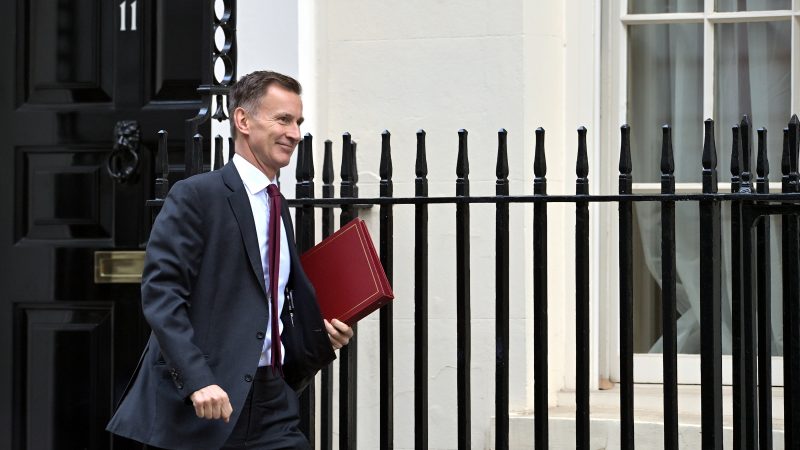
The spring budget is fast approaching, and tax cuts are running around the chancellor Jeremy Hunt’s mind.
After seeing less fiscal headroom than initially expected, he is now considering spending cuts he is now considering spending cuts or tax rises elsewhere to fund them – on top of real-term cuts already in the pipeline and despite a large budget deficit. Inheritance tax (a long-time target for many Conservatives) is hanging around the front of the tax cut queue.
But in Labour, Keir Starmer kicked off 2024 with the opposite pledge: Not only is he “fundamentally opposed” to an inheritance tax cut, Labour would in fact reverse any cut the Conservatives made.
Labour’s taken a firm stance on inheritance tax
That’s a big statement – but he’s right to take a stand on this. It’s true, the revenue is desperately needed to help fix the country. But beyond this, an inheritance tax cut could further alienate a British public longing for meaningful change over political gestures.
On the revenue, inheritance tax is worth £7 billion each year now, and that will increase to over £10 billion by the end of the next parliament.
If the Conservatives cut the rate in half – as is rumoured – that means around £5 billion less for Labour within the fiscal rules.
Inheritance tax cuts would damage Labour’s programme for government
Starmer needs to make a compelling offer on public services in the coming election and beyond, and losing revenue from inheritance tax (which is paid by those who feel it least) would close off his space to do so.
If Labour forms the next government, delivery of their promised ‘decade of national renewal’ will hinge on decisions like this.
Yet, we know that concern about inheritance tax is widespread. Demos has spoken with over 100 members of the public about this issue in focus groups – and cries of “double taxation”, “a voluntary tax” and “the politics of envy” are commonplace.
Labour can’t fall pray to simplistic thinking about the tax
Given this emotive baggage, nervous Labour MPs may fear a repeat of 2007, when Gordon Brown backed away from an early election after George Osborne pledged to raise the threshold. Those that buy into this narrative may be tempted to ‘outflank’ the Conservatives by promising to match any cuts in inheritance tax.
But we shouldn’t reduce the British public to such simplistic thinking. Of course people have concerns, but context is key. The world has moved on from 2007, and today’s struggling economy and broken public services drive a different set of priorities.
Our conversations with the public reflected this. Firstly, people are very aware that cutting inheritance tax will cut funding available for public services.
Secondly, inheritance tax feels detached from normal people’s economic struggles, where people want immediate help to deal with the cost of living.
Thirdly, when faced with the choice, people prefer tax cuts they would feel in their day-to-day lives – but this is true for very few people in the case of inheritance tax. . In polling, just one in seven people choose inheritance tax in the top three taxes they want to see cut.
The Tories are not united on this issue
These narratives could harm not only a policy to cut inheritance tax, but the wider Conservative brand. Unexpected opposition to the cut from the likes of Julia Hartley-Brewer, Jonathan Gullis, and Simon Clarke shows that some on the right are aware of that fact.
This is also reflected in the polls. Demos polling found that, if the Conservatives scrapped inheritance tax, it would drive no change in their favorability in marginal seats, and only a two percentage point net gain across the country. These are pitifully low numbers for an expensive tax cut.
This is made clear by the opportunity cost; instead spending £7 billion on the NHS would drive a 35 point net increase in favorability in marginal seats, or 32 points across the country. Labour should not feel that it has to accept cuts or abolition of inheritance tax because of its political popularity.
Given all this – as my colleague Ben Glover has argued – Labour have nothing to fear from opposing an inheritance tax cut. The public has other priorities, and the next government would do well to show that they understand this.
If Labour wins a big majority, it should be bolder still
If they win a big majority, Starmer and Reeves should be even bolder. With the value of inheritances set to double by 2045 – reaching over £230 billion annually – asking for more tax from this pot could help raise the revenue needed for national renewal.
If the next government championed a simpler and fairer tax system, they could be rewarded for delivering a simpler and fairer inheritance tax too – one asking for greater contributions from the UK’s mounting wealth rather than its stagnant wages, ensuring those with the most pay their share.
Inheritance tax reform is possible, whether it’s revising the exemptions, taxing inherited capital gains differently or hypothecating the tax to fund social care or homes for the next generation. Given the economic challenges facing Britain, such reform will become increasingly important, while cutting the tax becomes increasingly off the mark.




More from LabourList
‘Labour won’t stop the far right by changing leaders — only by proving what the left can deliver’
‘Cutting Welsh university funding would be economic vandalism, not reform’
Sadiq Khan signals he will stand for a fourth term as London Mayor